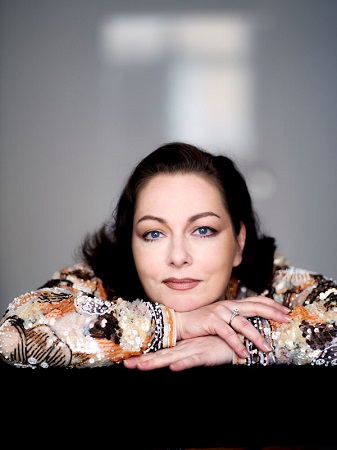The patent sincerity of Röschmann’s singing - not to imply anything other
than sincerity about Martineau’s! - was evident from the very first of the
late Gedichte der Königin Maria Stuart, ‘Abschied von Frankreich’.
Its deceptive simplicity was not exactly mirrored but perhaps paralleled in
the figures almost, yet never quite, remembered from the piano
music in Martineau’s part. These are not quite fragments, late though they
may be; nor are they anything like so disturbing as the Gesänge der Frühe, op.133, for piano solo, which I find almost
impossible to listen to.
There is certainly something suggestive of the fragment too them, though,
not least as a reaction to a bare-bones simplicity (sometimes) that itself
proves suggestive of a (mis)remembered Bach as chorale writer. Certainly
the tension evoked between ritual and expression in ‘Nach der Geburt ihres
Sohnes’ brought Schumann’s Leipzig predecessor to mind, as did the
rock-solid, continiuo-like piano part to the closing ‘Gebet’. If that were
the church as rock of St Peter, Röschmann suggested a more emotional
disciple: imploring, trustful, and in the last place visibly, audibly
moved, just as she had been in the preceding ‘Abschied von der Welt’.
Wagner, the only one of these three to have been born in Leipzig, came to
mind not only in the vocal line, but also in the arioso-like piano writing
- at least in this performance - of ‘An die Königin Elisabeth’, the colour
of Röschmann’s lower range both lacerating and comforting; ‘Doch des
Schicksals Walten zerriesst das Segel oft, dem wir vertraut.’
An expansive, almost Straussian vocal account of ‘An eine Äolsharfe’ opened
the selection from Wolf’s Mörike-Lieder. Repetitions of the words
‘wie süss’ were operatic in the best sense, at least so far as Lieder-singing is concerned: alert to a drama that needed no
stage. Ghosts of Schubert and Wagner - composers far too little considered
together - haunted ‘Das verlassene Mägdlein’; indeed, Schoenberg, in one of
his many synthetic not-quite-reconciliations came to mind too. Intervals
proved properly generative, Webern within an aural stone’s throw. Relief and instability characterised ‘Erstes Liebeslied eines Mädchens’.
Each song was unquestionably considered on its own terms, yet formed part
of a programme too: following on, contrasting, questioning. And so, when
the opening of ‘Denk es, o Seele!’ seemed reminiscent of ‘Das verlassene
Mägdlein’, it was equally important for it to proceed as it did, very much
in its own way, albeit mediated by the experience so far. ‘Verborgenheit’
offered a dark, almost operatic climax to the set that yet offered
something of necessary or at least anticipated reconciliation: again not
entirely unlike Schoenberg.
The second half was given to Brahms. Alte Liebe’s simplicity was
apparent - until one listened to the piano harmony: never exaggerated, yet
ever so telling. A noticeably later (1888 to 1876) Auf dem Kirchhofe suggested that special vehemence one often hears
in the late piano pieces, its Bach allusion poignant on many levels; we
were reminded once again just how much the entire German musical tradition
owes to the Lutheran chorale. Röschmann’s evocation of life surging through
the veins as the moment of transformation in Unbewegte laue Luft
suggested, not inappropriately, the ‘namenlose Freude’ of Fidelio,
whilst the early Liebestreu (1853) sounded intriguingly close to a
recollection of Senta’s Ballad that yet ended in soft-spoken (sung)
tragedy. Meine Liebe ist grün and Wir wandelten both did
- and expanded upon - what their titles and poems suggested, both seemingly
preparing for the moments of frozen time experienced in Nachtigall
.
A final Von ewiger Liebe seemed to want to return to the earlier
world of Schumann, yet could not, exploring instead its own, beautifully
judged melancholic passion: echt-Brahms. And yet, was that just a
hint of proto-Mahlerian irony? Or was that just me? We were left to wonder
- and indeed to desire more, which we received in two finely contrasted
encores: Schumann’s Die Lotosblume, in which a similar tension
between the ironic (Heine) and the sincere (Schumann) was to be heard, and
reconciliatory Liszt, in the guise of Es muss ein Wunderbares sein.
Mark Berry
Dorothea Röschmann (soprano) and Malcolm Martineau (piano)
Schumann: Gedichte der Königin Maria Stuart, op.135; Wolf: Mörike-Lieder: ‘An eine Äolsharfe’, ‘Das verlassene
Mägdlein’, ‘Erstes Liebeslied eines Mädchens’, ‘Begegnung’, ‘Denk es, o
Seele!’, ‘Auf ein altes Bild’, ‘Verborgenheit’; Brahms: Alte Liebe
, op.72 no.1, Auf dem Kirchhofe, op.105 no.4,Der Tod, das ist die kühle Nacht, op.96 no.1,Unbewegte laue Luft, op.57 no.8, Liebestreu, op.3 no.1, Meine Liebe ist grün, op.63 no.5, Wir wandelten, op.96
no.2, Nachtigall, op.97 no.1, Von ewiger Liebe, op.43
no.1. Dorothea Röschmann (soprano)/Malcolm Martineau (piano).
Wigmore Hall, London, Monday 10 September 2018.
